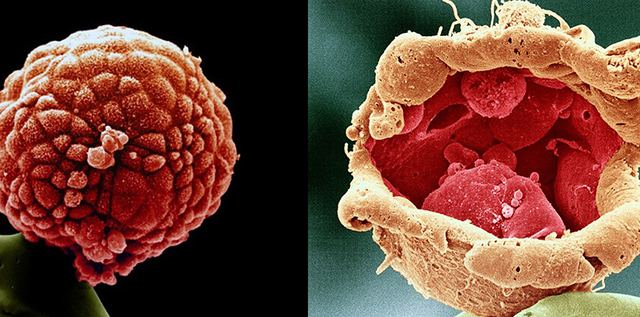
20:34 9th February 2016 | Fertilised Embryo
Blastocyst Embryo Day 5 Transfer Fertilised Embryo Conventional IVF Egg Collection Improved Pregnancy Rate Healthy Embryo Multiple Pregnancies Technologically Advanced Treatment Bridge Clinic IVF Clinic Highest Standards International Excellence
A blastocyst is an embryo that has been developed in the laboratory for five or six days after being fertilised. It is now possible to transfer blastocysts to the uterus as opposed to the conventional IVF approach which involves transferring three or four embryos to the womb, three days after egg collection and fertilisation.
Transferring blastocysts is an exciting development because recent advances in blastocyst culture and transfer have resulted in improved IVF pregnancy rates and reduced multiple pregnancy rates. Typically, the strongest, healthiest embryos reach blastocyst stage because they have survived key growth and division processes and have a better chance of implanting into the wall of the womb due to their thin outer shell. The selection of potentially more viable embryos allows the embryologist to transfer fewer embryos - often one or two - which lowers the risk of multiple pregnancies while maintaining a high successful pregnancy ratio. The culture and transfer of blastocysts is an extremely delicate process and it is crucial that every stage is carried out with meticulous care. At Bridge Clinic, we offer the safest and most technologically-advanced treatments in Nigeria. We are partnered by the famous Zech Group of IVF clinics in Austria and are the only IVF clinic in Nigeria to have an internationally-accredited Quality Management System. This accreditation means that our equipment and the way we work meet the very highest standards of international excellence.
It is our standard of excellence that ensures our success with blastocyst culture and transfer because the process has very specific requirements. These include maintaining the correct temperature in the laboratory, the theaters, on the work surfaces, in the refrigerators and in the culture media as well as controlling the purity of the air in the clinic and ensuring the excellence of our embryologists. These laboratory specialists undergo a strict training process in order to maintain our high standards. This includes on-the-job training, completing a required number of procedures with and without supervision, attending formal lectures and passing written tests before receiving certification. So if your Bridge Clinic fertility specialist recommends a blastocyst transfer, you know you are in good hands.
Search by condition, treatment or keyword and conveniently browse our informative articles
Book an appointment online or search for a clinic close to you.
Book an Appointment